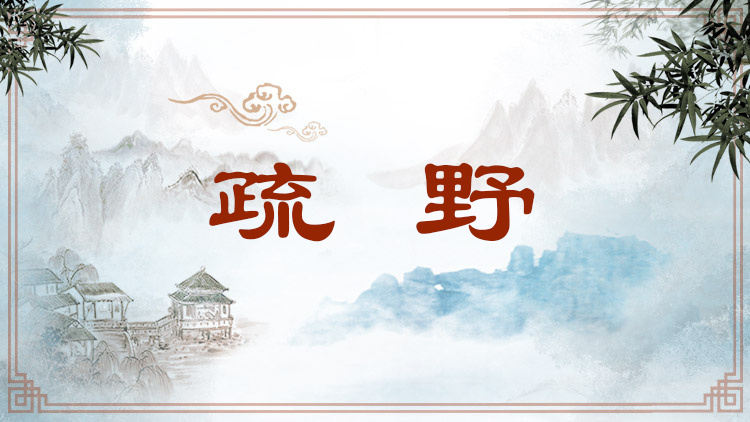疏野 Unrestrained and Ingenuous Spirit

洒脱不羁,真率自然。是唐代司空图提出的二十四种诗歌风格之一,也是非常重要的古典美学范畴。“疏野”所反映的实际是诗歌创作中的一种“无心”状态,即任由本心本性与外物遇合,不从主观情志出发,不刻意选择外在景观与素材,不刻意运用某种手法、技巧,不精雕细刻、反复推敲。为文如为人,洒脱不羁,率真豁达,质朴自然。作为一种诗歌风格和创作心态,“疏野”并非任性、随意和没有章法,而是力求摆脱先入为主的观念甚至是潜意识影响,但是前理解结构、审美经验积累等依然会对创作起一定作用。它不仅代表一种自然天成、冲淡疏旷的美学风格,还表现了一种胸怀万物而又超然物外的生存状态与人生境界。
This term refers to one of the twenty-four styles of poetry as propounded by Sikong Tu of the Tang Dynasty and falls into a very important classic aesthetic category. An unrestrained and ingenuous spirit reflects a state of "carelessness" in poetic creation, whereby the poet allows his inner self to encounter external things without constraint. It does not proceed from the poet's subjective feelings and aspirations nor does it choose any particular scenery and subject matter. It neither shows favor to any particular technique or means of expression, nor does it pay undue attention to wording. It encourages the poet to write just as freely, spontaneously, and naturally as he behaves in real life. As a poetic style and a creative mindset, an unrestrained and ingenuous spirit does not mean arbitrariness, petulance or lack of method. Instead, it aims to shake off the influence of any preconceived idea or subconscious thought, yet respect prior cognitive and aesthetic experience. It represents not only a natural, quietly elegant, and unrestrained aesthetic style, but also a magnanimous mind and an elevated state of being.
引例 Citation:
◎情性疏野曰闲。(释皎然《诗式·辩体有一十九字》)
诗歌表现诗人洒脱不羁、率真自然的性情,这被称为“闲”。
When a poet demonstrates a free and ingenuous spirit, he writes in a relaxing style. (Shi Jiaoran: The Theory of Poetry)
推荐:教育部 国家语委
供稿:北京外国语大学 外语教学与研究出版社
责任编辑:钱耐安





